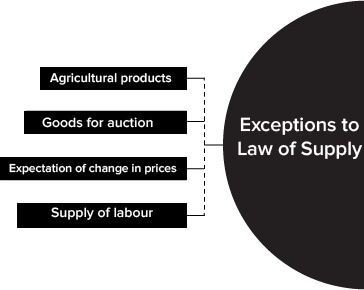What is the Law of Supply?
The law of supply states that the relationship between price and supply of a product.
According to the law of supply, the quantity supplied increases with a rise in the price of a product and vice versa while other factors are constant. The other factors may include customer preferences, size of the market, size of population, etc.
Also Read: What is Supply?
The law of supply can be explained through a supply schedule and a supply curve.
Table of Content [Show]
Law of Supply Example
For example, in the case of rise in a product’s price, sellers would prefer to increase the production of the product to earn high profits, which would automatically lead to an increase in supply.
Similarly, if the price of the product decreases, the supplier would decrease the supply of the product in the market as he/ she would wait for a rise in the price of the product in the future.
Thus, the law of supply states a direct relationship between the price of a product and its supply. Therefore, both price and supply moves in the same direction.
Also Read: Determinants of Supply
Law of Supply Definition
The law of supply defined as: “Other things remaining unchanged, the supply of a good produced and offered for sale will increase as the price of the good rises and decrease as the price falls.”
To understand the law of supply, it is important to discuss the concepts of demand schedule and demand curve.
Also Read: What is Supply Schedule?
Assumptions of Law of Supply
Like the law of demand, the law of supply also follows the assumption of ceteris paribus, which means that ‘other things remain unchanged or constant’.
As mentioned earlier, the supply of a commodity is dependent on many factors other than price, such as consumers’ income and tastes, price of substitutes, natural factors, etc.
All the factors other than the price are assumed to be constant. The law of supply works on certain assumptions which are given as follows:
Assumptions of Law of Supply are:
- The income of buyers and sellers remains unchanged.
- The commodity is measurable and available in small units.
- The tastes and preferences of buyers remain unchanged.
- The cost of all factors of production does not change over a period of time.
- The time period under consideration is short.
- The technology used remains constant.
- The producer is rational.
- Natural factors remain stable.
- Expectations of producers and the government policy do not change over time.
Also Read: What is Supply Curve
Exceptions of Law of Supply
According to the law of supply, if the price of a product rises, the supply of the product also rises and vice versa.
However, there are certain conditions where the law of supply is not applicable. These conditions are known as exceptions to the law of supply. In such cases, the supply of a product falls with the increase in the price of a product at a particular point of time.
For example, there would be a decrease in the supply of labour in an organisation when the rate of wages is high.
The exception to the law of supply is represented on the regressive supply curve or backward sloping curve. It is also known as an exceptional supply curve.
Exceptions of Law of Supply are:

Let us discuss important exceptions to the law of supply in detail.
Agricultural products
The law of exception is not applicable to agricultural products. The production of these products is dependent on so many factors which are uncontrollable, such as climate and availability of fertile land.
Thus, the production of agricultural products cannot be increased beyond a limit. Therefore, even a rise in price cannot increase the supply of these products beyond a limit.
Goods for auction
Auctions goods are offered for sale through bidding. Auction can take place due to various reasons, for instance, a bank may auction the assets of a customer in case of his failure in paying off the debts over a period of time.
Thus, supply of these goods cannot increase or decrease beyond a limit. In case of these goods, a rise or fall in price does not impact the supply.
Expectation of change in prices
Law of supply is not applicable under the circumstances when there is an expectation of change in the prices of a product in the near future.
For instance, if the price of wheat rises and is expected to increase further in the next few months, sellers may not increase supply and store huge quantities in the hope of achieving profits at the time of a price rise.
Supply of labour
The law of supply fails in the case of labour. After a certain point, the rise in wages does not increase the supply of labour. At higher wages, labour prefers to work for lesser hours. This happens due to change in preference of labour for leisure hours.
Leave a Reply